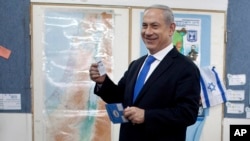JERUSALEM —
Israelis flocked to polling stations Tuesday for a parliamentary election that is expected to give nationalist Prime Minister Benjamin Netanyahu a third term in office.
Israel's electoral commission said 47 percent of voters had cast their ballots by 4 p.m. local time on Tuesday, marking the highest mid-day turnout for an election in 14 years.
Opinion polls leading up to the vote consistently showed that Netanyahu's ruling Likud party, paired with its secular nationalist partner Yisrael Beitenu, were likely to win the most seats for their joint party list, far ahead of the main opposition center-left Labor party.
Some surveys predicted the Jewish Home party, led by young and charismatic entrepreneur Naftali Bennett, will become the third largest faction in parliament. Bennett has said Israel should annex large portions of the West Bank, where the Palestinians hope to build their state.
But Labor, Likud's traditional rival, was also projected to make gains in the voting.
Negotiations to form the next Israeli government have already begun. Analysts say they are likely to be difficult.
Voter concerns
Liliane Brunswich, who immigrated to Israel 50 years ago, voted in the well-to-do German Colony neighborhood. She said security was her primary concern.
"I want our government to protect Israel," she said.
Jack Jamal said most Israelis want peace with their Palestinian neighbors but that it is not likely to happen because of the stalled peace talks.
"The main issues I think have been domestic in this particular election," he said. "They're talking about social issues, economic issues, equality of opportunities, equality of obligations. These are the main issues."
Recent immigrant Sylvia Sefor said social issues like education and health were important but the growing budget deficit was a big worry.
"I am also very much concerned about debt," she said. "This country has been good in keeping the economy and budgets and I'm concerned that it shouldn't fall into more debt."
Israel's budget deficit doubled last year to four percent of gross domestic project and was the main reason for the early elections.
Economic worries
In the predominantly Arab neighborhood of Beit Safafa, Khalil Salman said that economic issues were important but he hoped the new government would do more for Israeli-Arabs who make up 20 percent of the population.
Salman said the most important thing for the citizens is to obtain their rights, all their rights.
Neighbor Masaab Tawil said he was not going to vote.
"It will stay the same," Tawil said. "The right side will help only the Israeli people and care for them. The Israeli government will not look at us, the Palestinians."
Haifa al-Ayan brought her two young children with her to the polls. She said she would ask Israel's next leader to think of the future.
"I would ask him to think of children in both societies, first of all, and to raise education especially in the Arab society," she said.
Preliminary unofficial results are expected after the polls close late Tuesday night. Official results are to be announced in one week.
VOA's Michael Lipin contributed to this report.
Israel's electoral commission said 47 percent of voters had cast their ballots by 4 p.m. local time on Tuesday, marking the highest mid-day turnout for an election in 14 years.
Opinion polls leading up to the vote consistently showed that Netanyahu's ruling Likud party, paired with its secular nationalist partner Yisrael Beitenu, were likely to win the most seats for their joint party list, far ahead of the main opposition center-left Labor party.
Israel's major parties
Israel's Major Political Parties:
- Likud: Israel's main conservative party; supports the Israeli settlement movement in the occupied West Bank
- Yisrael Beitenu (Israel Our Home): Secular, nationalist party that wants to redraw borders so that parts of Israel with large Arab populations would be in a Palestinian state
- Yesh Atid: Centrist party founded by former journalist Yair Lapid in 2012
- Labor: Center-left party; supports renewing peace negotiations with the Palestinians and dismantling most Israeli settlements
- Shas (Union of Sephardic Torah Observers): Represents Israel's ultra-orthodox Jews of Middle Eastern, Mediterranean and Spanish origin and advocates a nation based on Jewish religious law
- Habayit Hayehudi (Jewish Home): Far-right party that advocates annexing more than half the West Bank and opposes the Oslo Peace Accords
But Labor, Likud's traditional rival, was also projected to make gains in the voting.
Negotiations to form the next Israeli government have already begun. Analysts say they are likely to be difficult.
Voter concerns
Liliane Brunswich, who immigrated to Israel 50 years ago, voted in the well-to-do German Colony neighborhood. She said security was her primary concern.
"I want our government to protect Israel," she said.
Jack Jamal said most Israelis want peace with their Palestinian neighbors but that it is not likely to happen because of the stalled peace talks.
"The main issues I think have been domestic in this particular election," he said. "They're talking about social issues, economic issues, equality of opportunities, equality of obligations. These are the main issues."
Recent immigrant Sylvia Sefor said social issues like education and health were important but the growing budget deficit was a big worry.
"I am also very much concerned about debt," she said. "This country has been good in keeping the economy and budgets and I'm concerned that it shouldn't fall into more debt."
Israel's budget deficit doubled last year to four percent of gross domestic project and was the main reason for the early elections.
Economic worries
In the predominantly Arab neighborhood of Beit Safafa, Khalil Salman said that economic issues were important but he hoped the new government would do more for Israeli-Arabs who make up 20 percent of the population.
Salman said the most important thing for the citizens is to obtain their rights, all their rights.
Neighbor Masaab Tawil said he was not going to vote.
"It will stay the same," Tawil said. "The right side will help only the Israeli people and care for them. The Israeli government will not look at us, the Palestinians."
Haifa al-Ayan brought her two young children with her to the polls. She said she would ask Israel's next leader to think of the future.
"I would ask him to think of children in both societies, first of all, and to raise education especially in the Arab society," she said.
Preliminary unofficial results are expected after the polls close late Tuesday night. Official results are to be announced in one week.
VOA's Michael Lipin contributed to this report.








